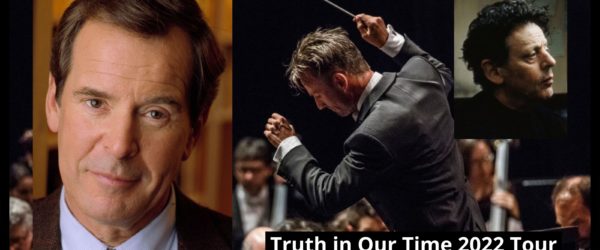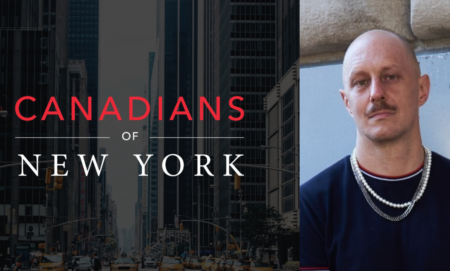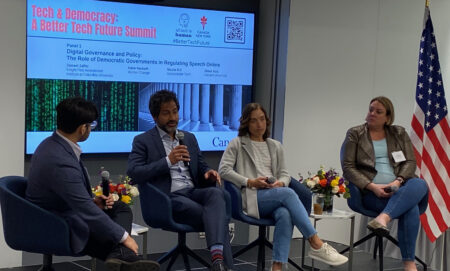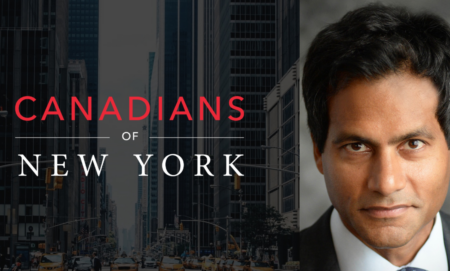Back on tour after a lengthy delay, Canada’s National Arts Centre (NAC) Orchestra returns to Carnegie Hall on April 5 for the U.S. Premiere of Philip Glass’s Symphony No. 13. A moving tribute to the late Canadian-born journalist Peter Jennings, the Symphony was commissioned by the Jennings family to support the theme of Truth in Our Time. Jennings was born in Toronto and became a highly respected news anchor for ABC News. He was also a trustee of Carnegie Hall during his years in New York City and was the founding director of the American chapter of the Friends of the NAC Orchestra. We caught up with Music Director Alexander Shelley to learn more about the ideas driving this special night.
Tickets are available here. Use promo code NAC37542 by March 31 to save 25%.
How did the theme Truth in our Time come about?
We wanted to explore Truth in Our Time in our programming in general. At the same time, Sarah Jennings (the sister of Peter Jennings) wanted to commission a work that would celebrate his life and the values that he stood for. We thought that was perfect, because Peter Jennings was perhaps of the last generation of news anchors in a world where there was a collective trust — where if a news anchor reported something, it was objectively sourced and people could trust it as the Voice of Truth.
We thought that was an interesting prism to look through. And when we talked with the Jennings family about composers, Philip Glass was always at the top of our list. He’s never shied away from engaging with extra-musical themes in his theater work, or in his work with pop and rock musicians, writers, and poets. He was thrilled by the idea.
How does a composer express ideas without words?
There’s a two-pronged answer to that. One area that interests me greatly is the work by leading behavioral psychologists and in popular books like Thinking Fast and Slow, by Daniel Kahneman, which re-examines how we think and how we perceive the world. Kahneman argues that we react to pre-formed opinions before we rationalize our decisions. People tend to know what they want and then justify their decisions afterwards. The argument is that the gut — what he calls the fast brain — leads us to places, then the slow brain rationalizes how we got there afterwards.
The arts can hotline to the core of how we interact with the world and what leads us to make those gut decisions. Music, visual arts, architecture, and writing can all lead the fast-thinking brain and gut to places where the rational mind then follows. If music can open up empathetic channels in you, then your rational mind may start to say, “Maybe I should love more; maybe I should care more; Maybe I should empathize more.” If the music we’re listening to is violent and brutal, if it’s rhythmic, if something from our ancestors of a million years ago is lit up, then perhaps we become more aggressive in our thinking and rationalize that behavior in turn.
The connection between art and politics has never been lost, either — particularly on dictators. I was a music director in Nuremberg for nearly a decade, and that city is still full of buildings that were designed to inspire the populace to believe in the words that Hitler and the Nazis were using. They are powerful buildings; they do awaken something in you.
As interpretive artists, we have a responsibility to ask ourselves, what is the message that we believe a piece has? In our program we’re doing Shostakovich’s Ninth Symphony. He wrote it in 1945, at the end of the Second World War. Russians call it The Great Patriotic War and Stalin’s regime told him in no uncertain terms to write a great patriotic symphony — something bombastic and big that spoke to the patriotic verve of the time. They expected something along the lines of Beethoven’s Ninth Symphony. Shostakovich wrote something subversive and sardonic and sarcastic — and it led to the symphony being censored. It wasn’t performed for many years after.
In the music, Shostakovich did express the truth of Stalin’s time — but it was the truth of the people living through it. He’s saying we may have won this war, but what have we lost? Tens of millions of Russians were murdered. That was far more dangerous than what we do in our Western countries now.
As artists we have to get to the root of that. We have to make sure that a phrase that could sound chirpy and uplifting doesn’t, because Shostakovich was right on the line between what he was allowed to do and what he wasn’t.
What’s worth remembering is that in North America and the UK, there are many legal avenues for expressing discontent. You can openly subvert government with words, music, and art. You can question, you can make fun. You can undermine. These are still suppressed in many countries. Shostakovich lived in fear for his life after he finished that symphony. So I think we have a duty to recognize it when it happened in previous generations and cultures. Our endgame is to create a wormhole from April in New York at Carnegie Hall back to 1945. The expressive power of the music can speak to those ideas.
What should people be listening for to hear Truth in the programming?
There are three pieces on the program that each deal with the same issue:
The Shostakovich symphony is explicitly political in the way it’s written. It starts lightly and then goes into a very personal cadenza on the bassoon. It’s heart on-the-sleeve is emotional and political if you put yourself into the time that it was written.
Then you have Korngold’s Violin Concerto, which was written by Erich Korngold, who escaped anti-Semitism in Austria to settle in California. He wrote for film for the entirety of the war and really defined the big orchestral sound of Hollywood that you still hear today. He said “only when the Nazi regime falls will I write another work for the concert stage” and this Violin Concerto is that work. You can hear his truth from that moment. It’s a bright, happy, joyous work that feels like it’s taking wing. This was the expression of a Jew who’d had to flee his homeland and was for the first time expressing his feelings of joy at the fall of Nazism.
With the Philip Glass work, you have something completely different again. It’s very interesting to read his notes. On one hand, he says he was greatly interested in Truth in Our Time and in Peter Jennings, who was Canadian by birth and American by choice. On the other, he says a composer who tries to express something about Truth is on dangerous ground. The best they can do is write the music that they believe in and like. So I think he leaves the door open for us as interpreters and listeners to hear as much, or as little, about the idea of Truth in Our Time as we wish.
What does the piece sound like?
It’s an eminently accessible piece. It’s also optimistic, which is perhaps interesting. He could have gone in so many different directions, but this is something that shines. It feels youthful. It feels optimistic. It feels lacking in skepticism, lacking in darkness, particularly because of the words that he wrote. We don’t want to read too much into it, but his decision not to go dark or too cerebral speaks to his own relationship with the Truth. It’s an interesting cross-section that works.
What excites you most about this particular concert?
This is fabulous music. It’s really great. We’ve got works by Nicole Lizée, a brilliant young Canadian, plus a few surprises up our sleeves that aren’t printed on the program, and a real diversity of voices that the audience can look forward to. The Orchestra is absolutely superb, and I cannot wait for our New York friends to hear it in that context.
I’m also excited about the theme. It augments the music. It’s asking, how does art relate to our everyday lives in the conversations we need to have in our society? How can it augment those conversations? How can it add to our experience of life? Because I think for many audience members, bringing art music into your life broadens your perceptions of what’s going on in the world.
It doesn’t have to just be a nice sound, though it can be if you want. If you want to come to Carnegie Hall and just sit back and swim in beautiful sound, there’s no obligation to do more than that. But if you’d also like to think about how these brilliant composers and thinkers and humans interacted and interact with their times to say, this is how music can also offer something extra in you palate, then this is a program for you, too.
Joining the NAC Orchestra as a soloist will be 2021 Gramophone Artist of the Year James Ehnes, who will be playing Erich Korngold’s Violin Concerto. Below, Ehnes reflects on his long relationship with the Orchestra and the relationship between honesty and truth in the arts.
This is a special event for Canada and for its relationship with the U.S. on several fronts. How important is it to you to be part of it?
It would be hard to overstate it. The National Arts Centre as an organization has such significant meaning in Canada. It’s really one of the great honors of my life to be associated with them and to have had such a long relationship with the Orchestra. My first performance with it was 29 years ago — a lot of happy memories.
It’s been several years since they played in New York, so I’m excited for audiences here to experience a world-class orchestra that they haven’t heard for a while. And I’m excited for the musicians to be touring again and performing for an enthusiastic audience in a foreign city. That’s real food for them. Performing for a camera doesn’t give you the same feedback.
On a personal level, it’s a special project coming at a poignant time. I spent eight years in New York — it was home for a significant period of my life. So to bring my friends together with the NAC Orchestra and play in a city that’s meant so much to me is truly special. Of course, there’s the added excitement of it being in such a beautiful venue. Every musician is excited to play Carnegie Hall – there’s a magic to it.
Many composers have used music to convey specific ideas and concepts. How do you see music tackling or conveying the idea of Truth?
I think artistic honesty is ultimately the thing that audiences respond most honestly to. You may see a performance that’s truly great, or one that the performer thinks is less than great. Perhaps they missed a note or played out of tune for a stretch. Or you may not have liked their interpretation of a piece. Ultimately, though, none of that is as important as whether you feel the performers are being honest.
That’s why there’s such variety in the art world. It reflects the great variety in humanity. When a composer is writing about an idea, it’s only going to be their own understanding or experience of it. And going into a performance, it ties in with the relationship we all have as consumers of artistic product. Truth can mean something different to every one of us. I think that’s why people turn to art — it can be what they need it to be.
What do you hope the audience will take something away from this event?
I don’t have expectations for my audiences. I’m not sure that that’s my right as a performer to ask them to take away something specific, and I wouldn’t expect them to. In a very general sense, I want people to get whatever they need. It’s a terribly complicated time for the world on so many levels. And I think that because music is such a powerful yet, unspecific art form, it can be different things to different people.
Tickets are available here. Use promo code NAC37542 by March 31 to save 25%.





